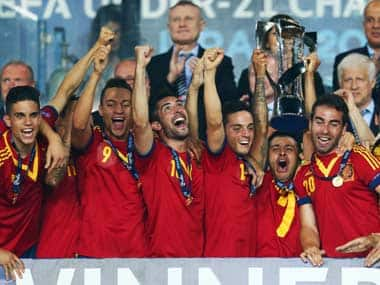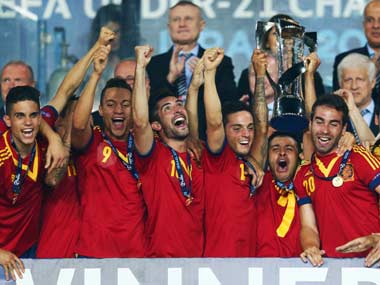Euro 2008, World Cup 2010 and Euro 2012 — no country in the history of football, and it is quite a history, had ever won three consecutive major international tournaments. But Spain, with their composed defence, clinical finishing and most impressively their sheer magical brilliance in midfield, have ruled over world football for the last five years. They’ve been unprecedented, ruthless, undisputed and even though boring, simply unstoppable. And if you thought that World Cup 2014 will bring an end to this era of success, then you’re wrong. Woefully wrong and probably even unfair to a crop of youngsters coming through the Spanish ranks — a team who have managed a 91% overall pass completion rate (3,103 successful passes out of 3,425 attempted) at the Euro U-21 Championships and have gone unbeaten in 26 games. The same crop of players, who are like for like to the current senior team and have won back-to-back European U-21 Championships (the squads however, differed). When you talk about Spain, you somehow don’t talk about David Villa or Fernando Torres or Carles Puyol. You talk about Xavi, Andres Iniesta and Xabi Alonso — even though that’s not taking anything away from the class of the aforementioned players. But it is the three midfielders who are the heart and soul of the team. Villa may add a finishing touch with aplomb while Sergio Ramos and Puyol may be the walls in front of goal, but take away Xavi, Iniesta and Alonso from the equation and Spain’s teamsheet suddenly looks lifeless. [caption id=“attachment_892065” align=“alignleft” width=“380”]  The new Spanish armada. Getty Images[/caption] And it is in this area that we are witnessing the remarkable rise of three more midfielders, who, without a doubt, will form the backbone of Spanish success in the coming years. Thiago Alcantara, Isco and Asier Illaramendi are not only similar in playing style, but their technical ability, positional sense and rise to fame has been just like the current trio. And while new talent like Alvaro Morata (Golden Boot winner at the U-21s), Rodrigo, Marc Bartra and Cristian Tello are also emerging, it will take some time for them to make it to the senior team because the World Champions are not a team steeped in the 30s. Apart from Iniesta (29), Xavi (33), Alonso (31), Villa (31), Alvaro Arbeloa (30) and senior pro Carley Puyol (35), the rest of the team are in their prime — most notably David Silva (27), Juan Mata (25), Gerard Pique (26), Jordi Alba (24), Sergio Ramos (27), Javi Martinez (24), Cesc Fabregas (26), Sergio Busquets (24) and Pedro (25). [embedalsosee] Thiago has become the most famous name since netting the hat-trick in the Euro U-21 finals against Italy, helping Spain to a 4-2 win and pivoting himself to top of the list of the most wanted young Spanish player. The 22-year-old possesses the technique and close control of Xavi, coupled with sublime tricks and flicks that can be compared to Iniesta’s. He’s more of a creator though, and is unlike Xavi when it comes to the risky pass. Thiago, actually, is someone who’s more rash — a habit which will most likely come under control in the future. Armed with creativity and an occasionally fierce tackle, he is among the most coveted products Barcelona have created in recent times — but it seems a clause in his contract will allow him to leave for a meager fee and Manchester United and Bayern Munich have been knocking on the doors. The other player in demand is Isco, who has already admitted that Real Madrid and Manchester City have made offers for him. Isco is one of those central midfielders in the mould of Iniesta, Silva and Mata — who likes to cut in from out wide and create openings for goal-scoring. In fact, he is better than Iniesta when it comes to that. Isco has amassed 16 goals in all competitions this season compared to Iniesta’s six, and was instrumental in Malaga’s run to the Champions League quarterfinals. Isco has changed the way the Spanish outfit played, adding a biting edge to their lackluster midfield and is a constant goal threat. Illaramendi completes this golden trio, and comparisons to Alonso are not off the mark. His passing range and patient probing adds composure to the team and allows the attackers a free roaming role. Illaramendi, just like Alonso, has been the backbone of Real Sociedad as they cemented a Champions League place. His dead-ball ability may not be as good, but that is a dimension that he could add to an already impressive array of talents. The best part of Illaramendi, and unlike young footballers of this generation, is that he is selfless — ready to sit in front of the back four while the action unfolds around him. Marc Batra has already been called up by Barcelona in the absence of Puyol and David de Gea’s class is undoubted between the posts. Also, strikers Rodrigo and Morata have a combined 36 goals between them this season. With Bayern Munich’s success threatening to topple the Spanish armada with a top-quality group of German stars, the La Roja needed to show what their future promises (they also beat Germany U-21). And what it promises, is the present.
In Thiago Alcantara, Isco and Asier Illaramendi, we are witnessing the remarkable rise of three more midfielders, who, without a doubt, will form the backbone of Spanish success in the coming years.
Advertisement
End of Article
Written by Pulasta Dhar
If there is one place Pulasta Dhar wanted to live, it would be next to the microphone. He writes about, plays and breathes football. With stints at BBC, Hallam FM, iSport, Radio Mirchi, The Post and having seen the World Cup in South Africa, the Manchester United fan and coffee addict is a Mass Media graduate and has completed his MA in Broadcast Journalism from the University of Sheffield." see more


)

)
)
)
)
)
)
)
)



